Peter Smith's Blog, page 46
May 10, 2021
Self publishings …
The three Big Red Logic Books continue to be downloaded at a very steady rate, about 1500 times a month between them — and over 200 paperback copies sold a month too. Now I know that there are enough sales to justify any additional effort, I might explore the costs and benefits of moving away from the easiest default option of using the Am*z*n self-publishing system. But plainly this self-publishing malarky is a pretty good way of getting what you write into people’s hands or at least onto their screens.
Of course, I realize full well that with things as they are, many people will need the imprimatur of a university press for their book to get brownie points for tenure/promotion purposes. But equally, there are a lot of cases where that doesn’t apply. For example, I chanced upon this notice of a Festschrift for Keith Hossack to be published next year by Bloomsbury. For £85. What exactly is the point of publishing like that? Wouldn’t everyone involved much rather have had their work read and thereby have Hossack’s work more widely promoted? As it is, how many university libraries will be forking out in these straitened times?
There are some downsides to totally independent self-publishing — so as I’ve said before, what we need is probably some more projects for book-publishing like the planned BJPS Open series. It will be interesting to see how that develops. Open access journal publishing, like the Philosophers’ Imprint, seems to be doing well and gaining standing. With enough support, something similar could and should happen for book publishing.
I’ve noted before that by far the most frequent download from the whole Logic Matters site is (the successor of) the Teach Yourself Logic Study Guide — downloaded more than 1700 times in April, for example. And encouraged by that, I have found myself over the few weeks working hard on an update, in a slightly different format which will now probably lead to another Big Red Logic Book. But it will be some weeks before a new version is ready for prime time.
It is actually a rather enjoyable project (sad but true!), revisiting some familiar old texts and taking another look at some less familiar ones, and writing/revising mini-overviews of the various areas the Guide covers. Should I be dispirited (‘it has taken this long for the penny to really drop?!’) to still be finding out new things along the way? Or should I just enjoy the continuing journey? The latter, I think!
The post Self publishings … appeared first on Logic Matters.
May 2, 2021
Sabine Devieilhe sings Ravel
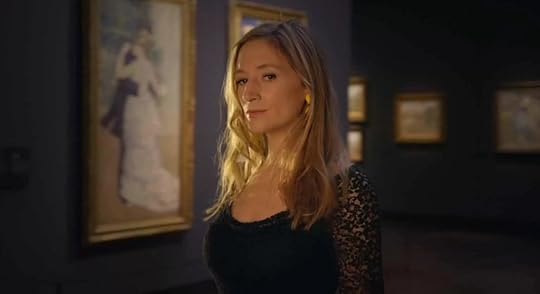 Sabine Devieilhe sings Ravel’s Cinq mélodies populaires grecques at Musée d’Orsay. Eight minutes of delight. Start the video linked at the foot of the review here at 49.38.
Sabine Devieilhe sings Ravel’s Cinq mélodies populaires grecques at Musée d’Orsay. Eight minutes of delight. Start the video linked at the foot of the review here at 49.38.
The post Sabine Devieilhe sings Ravel appeared first on Logic Matters.
May 1, 2021
Feferman’s virtual book: Logic, Mathematics, and Conceptual Structuralism
In the 2018 collection of articles Feferman on Foundations (about which more in a follow-up post), we learn that shortly before his death Sol Feferman proposed to OUP a sequel to his terrific volume of papers In the Light of Logic. He wanted to collect together some more of his later papers of broader philosophical interest, under the suggested title Logic, Mathematics, and Conceptual Structuralism.
Sadly the proposal seems not to have been taken up. However, but apart from any introduction he might have written, the book does exist in a virtual state, as all the papers are on Feferman’s website. So here is his proposed Table of Contents, linked to the papers which are divided into five groups (hopefully I’ve linked to the right targets!) :
I. My Route
Philosophy of mathematics: 5 questions.II. The Mathematical Mind
Mathematical intuition vs. mathematical monsters.And so on… Reasoning with infinite diagrams.Gödel’s incompleteness theorems, free will, and mathematical thought.III. What is Classical Logicality?
Tarski’s conceptual analysis of semantical notions.Logic, logics, and logicism.Set-theoretical invariance criteria for logicality. Which quantifiers are logical? A combined semantical and inferential criterionIV. Conceptual Structuralism
Logic, mathematics, and conceptual structuralism.Conceptions of the continuum.V. New Axioms for Mathematics?
Does mathematics need new axioms?Is the Continuum Hypothesis a definite mathematical problem?Some of these pieces are rightly very well known; others I haven’t come across before — so I’m now really looking forward to reading this virtual book.
The post Feferman’s virtual book: Logic, Mathematics, and Conceptual Structuralism appeared first on Logic Matters.
April 28, 2021
The Pavel Haas Quartet return for online concerts
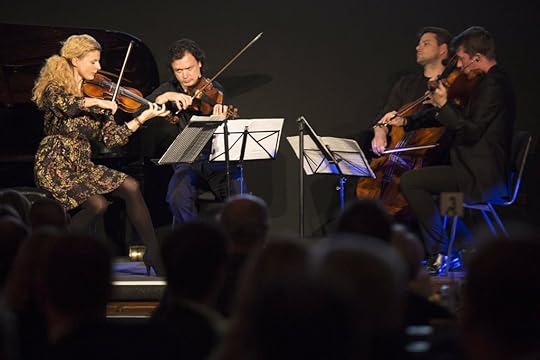
The great Pavel Haas Quartet suffered a real blow at the beginning of 2020 when they suddenly parted company with their violist. And then Covid struck. Like so many musicians, the PHQ have been having a hard time of it since. They were able to play a few local concerts in or around the Czech Republic in the summer, joined again by their founding viola player Pavel Nikl (as in the photo above). But it is six months now since they last gave a concert. However, an online concert is announced for Friday May 7th, for a series organised by Duke University, with the video available for 72 hours. They will be with their new violist, Luosha Fang, playing Beethoven’s Quartet in F Minor, op. 95, no. 11 (“Serioso”) and Martinů’s Quartet no. 7, H. 314 (“Concerto da camera”). For details, and very inexpensive tickets, see here. (The concert isn’t that well advertised, so do spread the word.)
A second online concert, with the pianist Boris Giltburg, is available from May 8th, from Spivey Hall at Clayton State University — though the programme details don’t seem to be given. But (again cheap) ticket details are here. The PHQ are also filming in the Suk Hall at the Rudolfinum a concert with Boris Giltburg for the Library of Congress series.
The post The Pavel Haas Quartet return for online concerts appeared first on Logic Matters.
April 27, 2021
More readings
I’ve been preoccupied for the last three or four weeks with a big domestic project which I’ve been putting off for years. But with help from two men with a van, and after multiple trips to the town dump, lots of shelf building, painting and the like, the job is done, and our rather large garage is looking positively civilized. At last. Rather satisfying. Tiring days, though, so not much energy left for logic.
Very enjoyable non-logical reads, however, have included Lorna Sage’s Bad Blood (which somehow I’d not read before), the ever-readable Jane Gardham’s Bilgewater, and Anne Tyler’s newly paperbacked and wonderfully humane Redhead by the Side of the Road.
Not so much enjoyable logic though. Various thoughts keeping nagging away at me about ways to improve my IFL; I think I’m just not going to be able to resist the urge to write a bigger and better third edition. So I’ve been dipping into various relevant books and articles. I’ve just reread the interesting but patchy long piece on the ‘History of Natural Deduction’ by Jeff Pelletier and Allen Hazen published in the final volume of The Handbook of the History of Logic, which has set me off worrying again about which particular choices in constructing an ND system are of some conceptual significance. Other contributions in that weighty volume (which is titled ‘Logic: A History of its Central Concepts) look potentially interesting too. But the first piece on ‘History of the Consequence Relation’ by Conrad Rasmus and Greg Restall turned out to be sadly disappointing: it covers the terrain too superficially to be very illuminating. I’ll report back on some of the other contributions. I’ve also been revisiting Neil Tennant’s Core Logic; but although I’m certainly sympathetic to his project, I’m again finding Tennant’s mode of presentation unnecessarily off-putting (we need a short Core Core Logic).
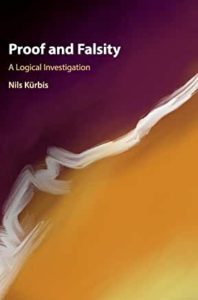 However, I am enjoying getting to grips belatedly with Nils Kürbis’s Proof and Falsity, which has now been out a couple of years. The topic is going to be negation and it’s role in deduction in general and natural deduction systems in particular, and you can’t get more basic than that! The opening two chapters — which take us some 90 pages into the book — set the scene, giving a sympathetic elaboration of the Dummett/Prawitz theme that it is the rules of inference which give the logic operators their meanings. As is familiar, the distinctively classical double negation rule and its equivalents seem to be anomalous, standing apart from the meaning-conferring balanced pairings of introduction/elimination rules which according to the Dummett/Prawitz theme fix meanings (Kürbis has helpful things to say in his Chapter 2 about what makes for such a stably balanced pairing). So I really want to see how the story now develops over the coming chapters — can you cleave to what is defensible about proof-theoretic semantics for the logical operators while giving a classical treatment of negation?
However, I am enjoying getting to grips belatedly with Nils Kürbis’s Proof and Falsity, which has now been out a couple of years. The topic is going to be negation and it’s role in deduction in general and natural deduction systems in particular, and you can’t get more basic than that! The opening two chapters — which take us some 90 pages into the book — set the scene, giving a sympathetic elaboration of the Dummett/Prawitz theme that it is the rules of inference which give the logic operators their meanings. As is familiar, the distinctively classical double negation rule and its equivalents seem to be anomalous, standing apart from the meaning-conferring balanced pairings of introduction/elimination rules which according to the Dummett/Prawitz theme fix meanings (Kürbis has helpful things to say in his Chapter 2 about what makes for such a stably balanced pairing). So I really want to see how the story now develops over the coming chapters — can you cleave to what is defensible about proof-theoretic semantics for the logical operators while giving a classical treatment of negation?
I’m not sure how the book will strike readers who are not already well-versed in the topic and who are not at least intrigued by Dummett’s wranglings with the issues; but the project appeals to me. I confess I’ve taken a peek at the final chapter, and I’m doubtful that I’ll want to end up where Kürbis does. However, the writing is engagingly clear and direct, and there have already been some telling arguments. So I’m much enjoying the journey so far.
The post More readings appeared first on Logic Matters.
April 14, 2021
The Chiaroscuro Quartet at Wigmore Hall
Wigmore Hall continue their stunning series of freely streamed concerts with the Chiaroscuro playing Haydn’s “Bird” and Schubert’s “Rosamunde”. One of my very favourite quartets playing, in particular, favourite Schubert — great! Wonderful performances (remarkably so, as the always impressive violist Hélène Clément was standing in at very short notice for Emilie Hörnlund).
The post The Chiaroscuro Quartet at Wigmore Hall appeared first on Logic Matters.
Recent readings
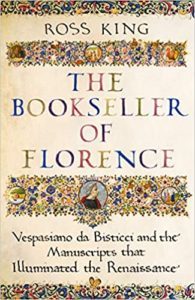 Logic/philosophy books have been arriving. A book aimed at students which is shallow and slapdash (evidently dashed off too fast, without taking enough advice from those who have actually thought hard about the topics). Another book aimed at students which I thought might be apt for mentioning in the Logic Guide: a bit better as far as it goes, but disappointingly thin — covers too much in far too short a compass, so the student reader again isn’t well served. A monograph on a topic that I’m much interested in, written in clotted prose and with a depressing penchant for obscure arm-waving generalities. And a straight logic text recommended to me, which I’ve again looked at with an eye to the Guide. It’s written for computer scientists and maybe later chapters on compsci topics are better; but so far I’m pretty unimpressed. All of these books could have done with an interventionist editor.
Logic/philosophy books have been arriving. A book aimed at students which is shallow and slapdash (evidently dashed off too fast, without taking enough advice from those who have actually thought hard about the topics). Another book aimed at students which I thought might be apt for mentioning in the Logic Guide: a bit better as far as it goes, but disappointingly thin — covers too much in far too short a compass, so the student reader again isn’t well served. A monograph on a topic that I’m much interested in, written in clotted prose and with a depressing penchant for obscure arm-waving generalities. And a straight logic text recommended to me, which I’ve again looked at with an eye to the Guide. It’s written for computer scientists and maybe later chapters on compsci topics are better; but so far I’m pretty unimpressed. All of these books could have done with an interventionist editor.
OK, I’m not going to name names. Because then I’d need to spend a lot more time making out the critical cases than I really feel inclined to do. Life is too short. But not very cheering or invigorating reading experiences.
Also recently arrived — a reprint of Abbott and Mansfield. If you are of a certain age and were properly brought up, those names will be so familiar, and you’ll probably have a vivid school-days recollection of the green cover of their grammar book. I’m trying to relearn Greek to keep the brain from rusting. And what is cheering is that I find that the core of Abbott and Mansfield looks remarkably familiar! For example, I still have much of the paradigm of λυω by heart, learnt at an age when these things stick. … I knew it would come in useful one day. Better late than never.
And a surprise birthday present from Mrs Logic Matters, Ross King’s new book The Bookseller of Florence. King’s story ranges widely over the intellectual life of renaissance Florence, and it all zips along most enjoyably. So this I can indeed warmly recommend as a fun and enlightening read.
The post Recent readings appeared first on Logic Matters.
March 26, 2021
Slow progress …
There have been distractions. So it’s been painfully slow progress on various projects over the last few weeks. In particular, it has been very slow work trying to write the early (pre-category-theoretic, scene-setting) chapters I wanted to put together for the Gentle Introduction. Partly that’s because I have been trying to decide what I actually believe about set-theoretic reductionism/foundationalism/imperialism …
Here though is a fairly recent paper that I’ve found very helpful. And I am prompted to mention it here because I discovered (in talking to a small and very unrepresentative sample!) that word about it hadn’t got around. So — if you are interested in the topic — let me recommend
Penelope Maddy, ‘Set-theoretic foundations’, in Caicedo et al, eds., Foundations of Mathematics, 2017.
Maddy begins, “It’s more or less standard orthodoxy these days that set theory – ZFC, extended by large cardinals – provides a foundation for classical mathematics. Oddly enough, it’s less clear what ‘providing a foundation’ comes to. Still, there are those who argue strenuously that category theory would do this job better than set theory does, or even that set theory can’t do it at all, and that category theory can. There are also those who insist that set theory should be understood, not as the study of a single universe, V, purportedly described by ZFC + LCs, but as the study of a so-called ‘multiverse’ of set-theoretic universes – while retaining its foundational role. I won’t pretend to sort out all these complex and contentious matters, but I do hope to compile a few relevant observations that might help bring illumination somewhat closer to hand.” And, particularly in the first part of the paper, it strikes me that she does an admirable and very judicious job of distinguishing various things that might be meant by talking of foundations here. Though that still leaves me with much to think about.
In another neck of the woods, I am getting back to updating what was the TYL Study Guide, and I have just uploaded a slightly revised version of Chapters 1 to 8. I hope to finish the new Chapter 9 over the coming days.
About fifty years late, I’ve also been enjoying thinking a bit more carefully about the Prior Analytics, and (relatedly) about ways in which the opening chapters of IFL could be significantly improved.
And so it goes … But, as I say, slow progress all round.
The post Slow progress … appeared first on Logic Matters.
March 25, 2021
The Meaning of Travel (again)
I wrote this a year ago: who would have guessed that twelve months on, the prospect of travel seems almost as remote as it did then … If you didn’t read Emily Thomas’s book when it came out, you missed a treat!
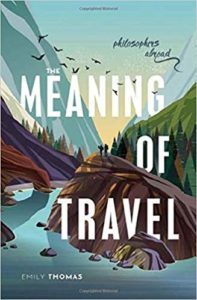 In mid December, the Uffizi can be almost empty of visitors. One year, we were sitting very quietly for some time in what was then the room with the great Botticelli paintings. A few other visitors came and went. But then there was a sudden flurry of noise; and from one corner of the room entered a group of young Chinese, each with their headset, with a guide talking into a microphone. The group processed without pausing to the opposite corner and left as quickly as they had arrived. The scene was saddening and comical — what was the point? But then the thought strikes: are our Florentine visits in recent years really much better? They are still fleeting, a week at most; our knowledge and understanding of what we are seeing is still shallow; yes, we know the restaurants and cafés the locals like; but we are skimming along the surface. What is the meaning of our travel here? (Or is it mere tourism?)
In mid December, the Uffizi can be almost empty of visitors. One year, we were sitting very quietly for some time in what was then the room with the great Botticelli paintings. A few other visitors came and went. But then there was a sudden flurry of noise; and from one corner of the room entered a group of young Chinese, each with their headset, with a guide talking into a microphone. The group processed without pausing to the opposite corner and left as quickly as they had arrived. The scene was saddening and comical — what was the point? But then the thought strikes: are our Florentine visits in recent years really much better? They are still fleeting, a week at most; our knowledge and understanding of what we are seeing is still shallow; yes, we know the restaurants and cafés the locals like; but we are skimming along the surface. What is the meaning of our travel here? (Or is it mere tourism?)
Emily Thomas’s new book The Meaning of Travel perhaps didn’t full answer my question. But it is a real delight. It is relatively short, and very nicely produced by OUP — in a small format too, so it will appropriately fit in a jacket pocket on your travels, if only as you stride across the common to your favourite coffee bar to read it. But perhaps that too can be like travel in a miniature way? In my case, the coffee bar at the end of my walk is run by Italians, the chatter is in Italian, the radio is Italian, the coffee and dolci are Italian, most of the other customers are non-English. Part of the pleasure, then, is relishing the slight otherness (albeit very safe and tame!). And as Emily Thomas suggests, “the difference between everyday journeys and travel journeys lies in how much otherness the traveller experiences”. The businessman who hops on a plane, spends two days cloistered in meetings held in English, stays with colleagues in a familiar international hotel chain, and is pampered again in business class as he flies home hasn’t really travelled, we feel.
The book is written with a light touch. There are a dozen engaging essays; on maps, for example; on how traveller’s tales challenged thoughts about innate ideas; on why mountains changed from forsaken places full of dangers to be avoided (Donne’s “warts and pock-holes on the face of th’earth”) to become places of spendour where you could encounter the sublime; on the idea of wilderness and our relation to nature (or Nature). Some of the usual philosophical suspects appear in familiar stories (Bacon, experimenting to the last, stuffs a chicken with snow, and catches a fatal chill; Descartes, never really settling in one place, travels to wintry Stockholm and dies of flu or perhaps pneumonia). But there are many less familiar philosophers here, on real or imagined journeys (I was intrigued by Margaret Cavendish’s bizarre-sounding Description of a New World, Called the Blazing-World). And sprinkled through the book are snippets from the author’s obviously lovingly assembled scrapbook of quotations and illustrations (travel adverts and posters for example), and some notes on her own travels. It all makes for a fun and thought-provoking read.
In the last section, “Returning Home: Top 10 Vintage Tips”, there’s a quotation from Descartes, in which he remarks of his reading that “conversing with those of past centuries is much the same as travelling”. That’s a thought which could have made for another intriguing essay on the relation between our travelling from place to place and our ‘travelling’ (as best we can) from time to time. And indeed are these not often bound together? When we (at least, the “we” who are likely to be this book’s readers!) go to Venice, it isn’t exactly Venice now that we want to see, but a Venice before mass tourism, before tacky gift shops and the like — so we explore down side canals, getting quite away from the modern clamour (which indeed is still surprisingly easy to do), or escape the crowds by wandering through the city late in the evening. An essay on this theme, the attractions of travelling to sites steeped in history to try to capture that sense of times past, would have been good to have too.
Early on in the book, Emily Thomas distinguishes travelling not only from making a humdrum journey perhaps for work or study abroad (or a less humdrum journey as a refugee, perhaps) but also from going on a pilgrimage. Which got me wondering whether here too is a theme for another essay. For isn’t travelling, say, to Florence (braving Ryanair, and — if you can’t go in December! — braving crowds and unpleasant heat too) a pilgrimage of sorts for some of us? We are visiting Santa Maria Novella, Santa Maria del Carmine, Santa Croce, …, because they are still numinous places, the frescoes and paintings still expressive of feelings which have a deeper pull and give us pause. Or, when he writes of it long after, when the world he travelled through on foot has vanished, doesn’t Patrick Leigh Fermor’s walk from the Hook of Holland to Hungary and beyond take on in the telling something of the character of a pilgrimage through Old Europe? I’m not sure: I would have liked to have heard still more, perhaps, about the varieties of travellings and their different meanings.
A writer Emily Thomas could perhaps have engaged with to add some further depth and nuance is Jonathan Raban (who oddly gets only the most fleeting mention for a comment about Byron). For Raban was not only one of the very best of all English prose writers in the last couple of decades of the last century, but the most reflective — philosophical, if you will — of travellers and travel writers. His late, great, Passage to Juneau (1999) should have appealed to the author of The Meaning of Travel, not only given some Raban’s themes (the discovery of otherness and of oneself in the process), but also given its location: some of Emily Thomas’s own book is structured loosely round her journeys through Alaska. But I’m thinking too of Raban’s earlier masterpiece, Old Glory from 1981, notionally recounting his travelling down the Mississippi in a small boat. I say “notionally” as this complex work is lightly disguised as a straight travel book, a literal recounting of a journey taken. But, as I’ve written here before, the one-time English literature lecturer warns us clearly enough. One of the epigraphs of the book is from T. S. Eliot (writing indeed of the Mississippi), starting “I do not know much about gods; but I think that the river/Is a strong brown god …” The other epigraph is from Jean François Millet: “One man may paint a picture from a careful drawing made on the spot, and another may paint the same scene from memory, from a brief but strong impression; and the last may succeed better in giving the character, the physiognomy of the place, though all the details may be inexact.” So we are set up for this to be a mythic tale, and for the “Jonathan Raban” who features as the narrator and in his adventures to be a very inexact rendition of the author and his own journey. And a mythic tale is what we get, a romance-quest — another kind of journey! — with ordeal by water, with auguries and signs, battles fought, a princess won (but also lost, for this is a flawed epic, and the journey ends in emptiness). Woven together with this are encounters with American myths of frontiers and journeys.
Raban’s is a many-layered book, particularly artful in the artlessness of its transparent prose. We are reminded that the lesser tales we tell ourselves about our own smaller travellings (at the time and after), while a lot less artful, are no doubt also shot through with their elements of fiction, as we weave our stories to fit some patterns we are perhaps only half-aware of. Which takes us back to The Meaning of Travel, which indeed has interesting things to say about the blurred lines between purely fictional travel narratives at one end of the spectrum and (say) some of Darwin’s writings at the other. It is such varied narratives which give our travels their varied meanings for us. Emily Thomas in her so-readable book helps us think about some of those narratives. I enjoyed it greatly. Treat yourself!
The post The Meaning of Travel (again) appeared first on Logic Matters.
March 12, 2021
David Makinson: A historical question about mathematicians and logic
David Makinson raises a very interesting issue, originally in a comment on my recent post on Jonathan Barnes’s book. It seems a pity to leave his question buried there, where it is likely to be overlooked, so I’m making it a guest post! He writes:
We know that many philosophers, theologians and polymaths (such as Aristotle) have written on formal logic, and some of their writings have survived, whether in whole or in fragments, quoted or distorted. Question: Were there any figures who were primarily mathematicians — from Greek antiquity through the Roman, mediaeval and renaissance periods but before, say, Leibniz — who investigated and wrote on the logic that they were actually using in their own work?
The question is particularly acute for Euclid and his school, since they were devoting immense attention to perfecting deductions from basic principles, but it arises for all those who carried out mathematical reasoning.
From my memory of reading in histories of logic, none are mentioned! Even so late a figure as Descartes, who wrote important guides to methodology and heuristics, does not seem to have ventured into formal logic, so far as I know. If, indeed, there is a big gap in the historical literature, how far is it really a gap in what was actually written, or merely in accidents of which texts have survived the tyranny of time, or even in the attention that has been accorded by historians of logic?
An interesting question indeed.
The post David Makinson: A historical question about mathematicians and logic appeared first on Logic Matters.



